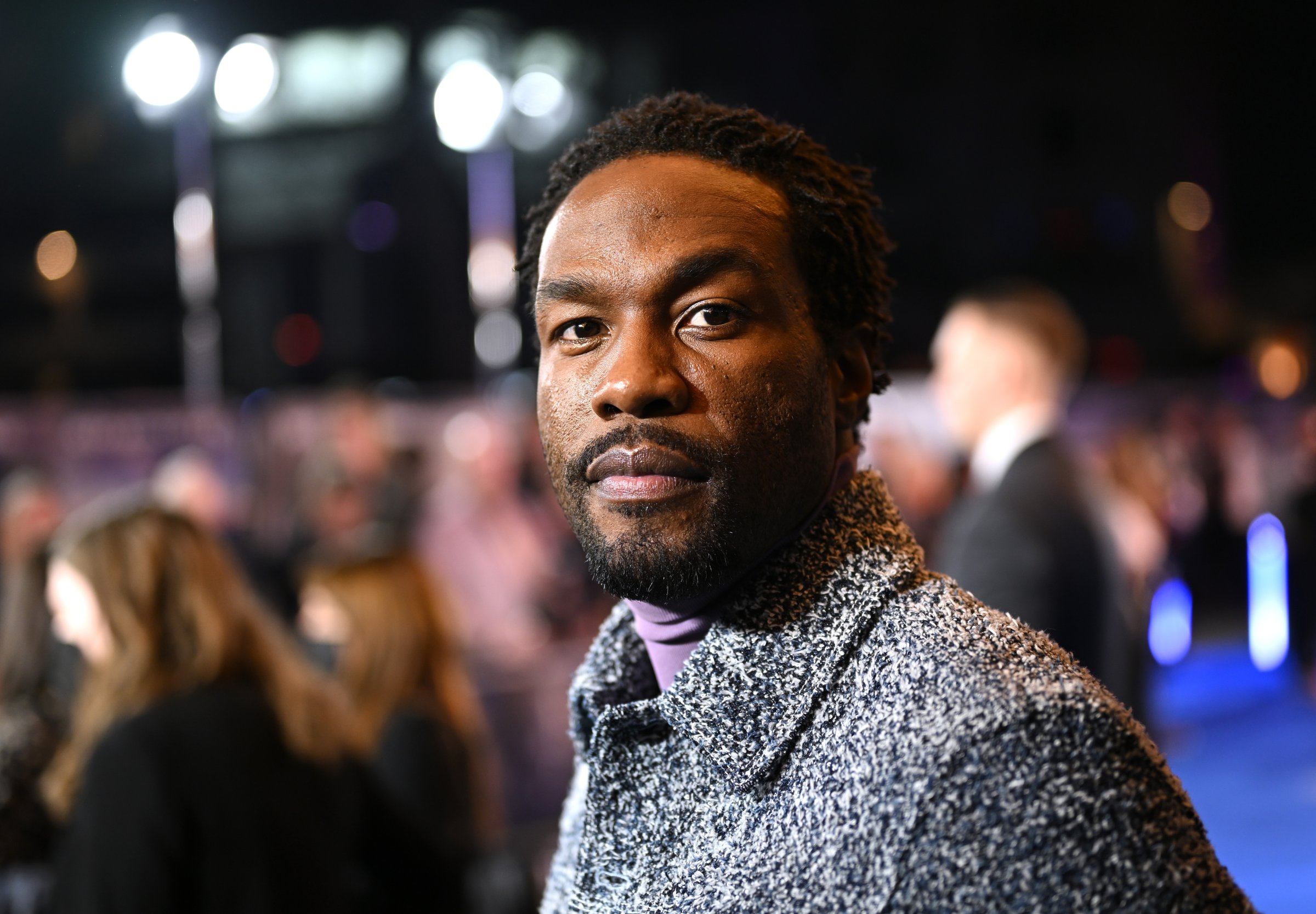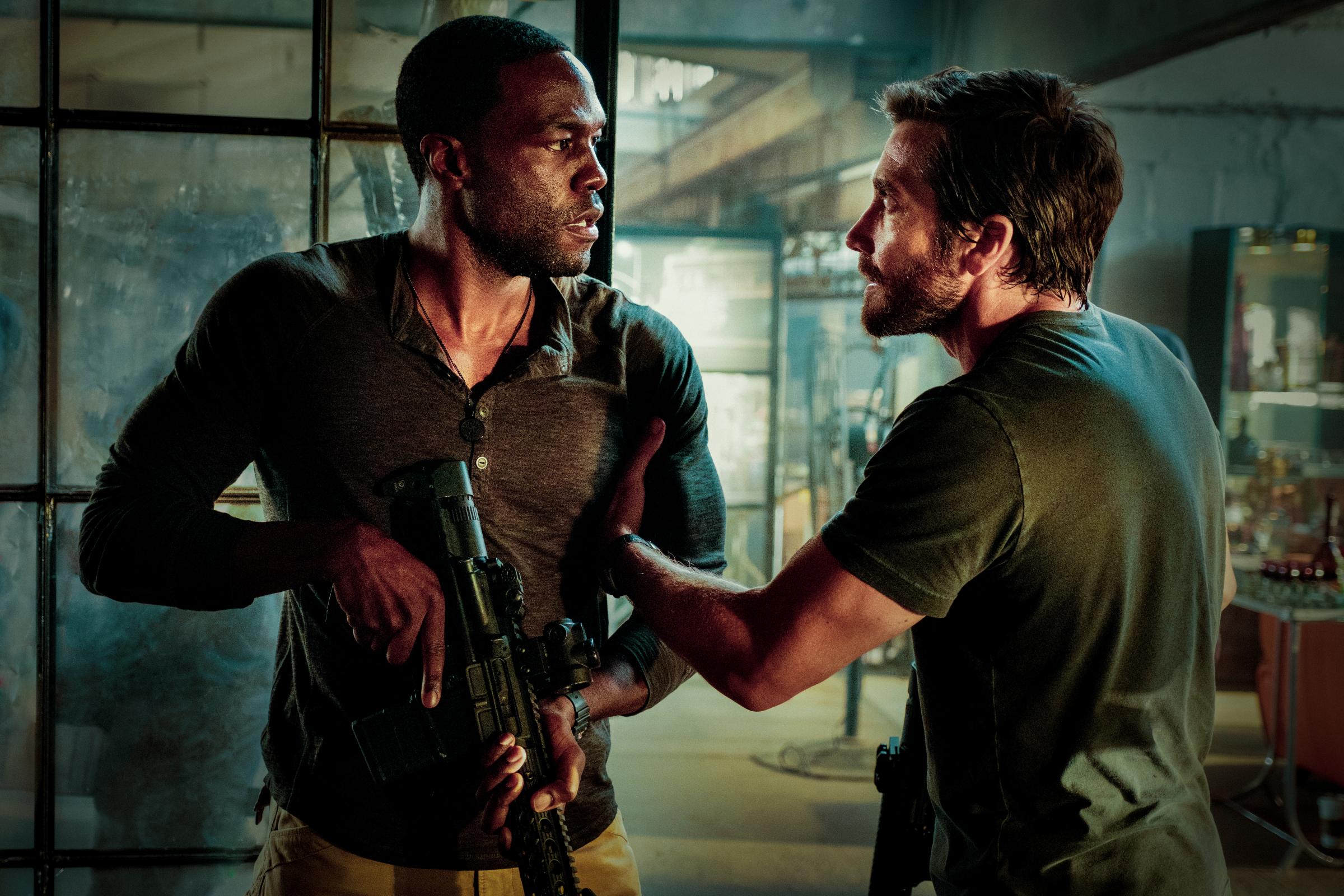
Michael Bay reportedly didn’t know who Yahya Abdul-Mateen II was before he cast him in his latest high-octane film Ambulance, but the actor is about to become a household name. In the last two years, Abdul-Mateen won an Emmy for his Internet-breaking performance in HBO’s Watchmen, headlined the hit horror remake Candyman, and fought alongside Keanu Reeves in Matrix: Resurrections. This year, he’s starring with Jake Gyllenhaal in Ambulance (out April 8) and with Jason Momoa in Aquaman 2.
Ambulance is something of an aberration in modern Hollywood—an action flick that’s not a sequel or a superhero movie but a concept-driven thrill ride. Abdul-Mateen stars as Will, a decorated war vet struggling to pay for his wife’s medical bills. In a bid to help him earn some quick cash, Will’s troublemaking brother Danny (Gyllenhaal) ropes him into a bank robbery. Things go predictably awry and the two steal an ambulance and take hostage an injured policeman (Jackson White) and a paramedic (Eiza González). The movie plays a bit like Speed, except the men at the wheel are bank robbers, and one of the hostages is performing emergency surgery on the other in an ambulance flying down streets at 60 miles per hour.
Abdul-Mateen is the heart of the movie, the calm negotiator in contrast to Gyllenhaal’s unpredictable, trigger-happy criminal mastermind. Abdul-Mateen has proven he can give a heart-wrenching performance: His turn as Bobby Seale in Trial of the Chicago Seven earned raves. But infusing chaotic action thrillers with emotional depth can be a challenge. Abdul-Mateen spoke to TIME about finding the humanity in his blockbuster characters, even while barreling down a Los Angeles freeway.
Are the sets of Michael Bay’s films as big and chaotic as the movies themselves?
He’s very curious. I think one more millimeter, and he would be there in the film. Mike reminds me of a 15-year-old kid with an unlimited imagination and an unlimited budget. He’s excited to show you his new cameras. He has a passion that I truly have not seen before. That’s saying a lot, because I just came from working with Lana Wachowski on The Matrix Resurrections. I’m really just making my rounds with eccentric directors in Hollywood.
You play a veteran who can’t afford to pay his wife’s medical bills, so you and your brother (Jake Gyllenhaal) decide to rob a bank. When things go wrong, you hijack an ambulance carrying a wounded cop and an EMT. There are no superheroes. No Transformers. It feels like a throwback Michael Bay movie.
That’s right. I play a guy with his back up against the wall, someone who is seen as a hero but doesn’t get much support. It’s an exciting movie, but I think people will be surprised by the amount of heart embedded in it. That’s just the type of actor I am. That’s definitely the type of actor Jake is.
Historically, Michael Bay has gotten criticized for spending too much time on explosions and too little on character.
This film is rooted in humanity. It’s rooted in brotherhood. It’s rooted in survival. I like to say every good story is a love story. And a good film makes our heroes or our villains have to fight tooth and nail in order to hold on to those things. That’s what I try to look for in everything that I lace my boots up for. Then the rest is really about the playground and the world that’s presented to me from the design to the script.

You play the villain Black Manta in Aquaman and the Lost Kingdom this December. Can you find humanity in a supervillain?
Yeah, admittedly, in the first Aquaman, there wasn’t an opportunity to show how multifaceted the character was. But now I get to explore what drives him not just as a villain, but as a human. He is someone experiencing a lot of paranoia, who is dreaming about revenge. With these big, fantastical movies, I get to take human feelings and just paint with a really large brush in really bright colors. But if there isn’t something real at the root, it’s just caricature.
I heard Hugh Jackman (who played Wolverine in the X-Men films) advised you to pick villain roles over superhero roles.
He said the bad guys are the best because you work the least amount of days, get the best lines and win all the fights except the last one. I don’t know about that, man. I think most of those were true. But I definitely worked a lot of days on Aquaman 2. It felt like the Black Manta movie. But I’m not complaining.
You mentioned Matrix Resurrections director Lana Wachowski and her eccentricities. What was
the most important thing she told you about the Matrix?
I brought questions to Lana at different times, but Lana was never really one to give us answers. I think that was intentional. The Matrix is very dense. You can always go deeper, explore further. The answer is never as simple as it may seem. If anything seems simple, you’re probably not thinking about it in a complex enough way. To that end, I’m still thinking about the character and what I would do if I had a second crack at it. I think that’s kind of cool. Most of the time I don’t do that. I’m pretty good at putting things down and walking away. But the Matrix continues to grow and change as technology matures, and as a society we’ve changed our relationship to the virtual world. It’s still perplexing. I land on clarity at different times.
More Must-Reads from TIME
- Donald Trump Is TIME's 2024 Person of the Year
- Why We Chose Trump as Person of the Year
- Is Intermittent Fasting Good or Bad for You?
- The 100 Must-Read Books of 2024
- The 20 Best Christmas TV Episodes
- Column: If Optimism Feels Ridiculous Now, Try Hope
- The Future of Climate Action Is Trade Policy
- Merle Bombardieri Is Helping People Make the Baby Decision
Write to Eliana Dockterman at eliana.dockterman@time.com